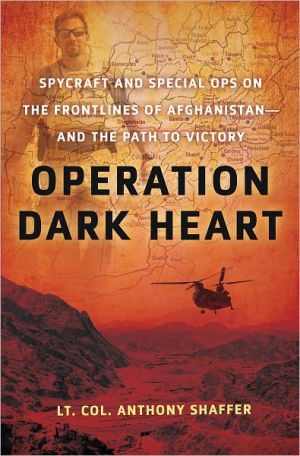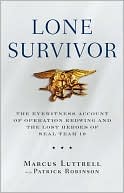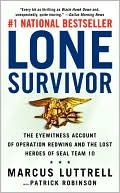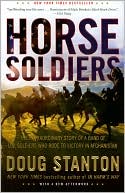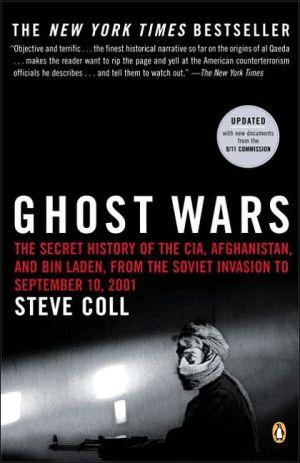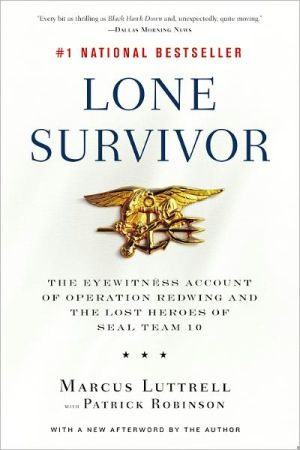Operation Dark Heart: Spycraft and Special Ops on the Frontlines of Afghanistan -- and the Path to Victory
On Friday, August 13, 2010, just as St. Martin’s Press was readying its initial shipment of this book, the Department of Defense contacted us to express its concern that our publication of Operation Dark Heart could cause damage to U.S. national security. After consulting with our author, we agreed to incorporate some of the government’s changes into a revised edition of his book while redacting other text he was told was classified. The newly revised book keeps our national interests...
Search in google:
IMPORTANT PUBLISHER S NOTE: On Friday, August 13, 2010, just as St. Martin's Press was readying its initial shipment of this book, the Department of Defense contacted us to express its concern that our publication of Operation Dark Heart could cause damage to U.S. national security. After consulting with our author, we agreed to incorporate some of the government's changes into a revised edition of his book while redacting other text he was told was classified. The newly revised book keeps our national interests secure, but this highly qualified warrior's story is still intact. An exciting eye-witness account of fighting terrorism in Afghanistan using the military’s most cutting-edge espionage tactics Lieutenant Colonel Anthony Shaffer had been part of espionage operations for years before he went into the field to help fight the war in Afghanistan. He led the charge in blocking the Taliban’s resurgence. But the policies that top officials relied on were hopelessly flawed. Shaffer and his team were forced to sit and watch as the insurgency grew just across the border in Pakistan. This wasn’t the first time he saw bureaucracy stand in the way of national security. He had participated in Able Danger, the aborted intelligence operation that identified many of the future 9/11 terrorists but failed to pursue them. His attempt to reveal it to the 9/11 Commission would not sit well with the top brass and would eventually cost him his job. For readers of Jawbreaker and Kill Bin Laden, Operation Dark Heart reveals what really went on, and what went wrong, in the Afghanistan war. Filled with stories of espionage and intrigue in the combat zone, Shaffer shows the spy’s side of the story Library Journal Shaffer, now an officer in the U.S. Army Reserve, was for years a covert intelligence operative for the Pentagon. In this autobiographical account of his work in Afghanistan and his eventual fall from grace at the Defense Intelligence Agency (DIA), he describes some of his experiences. After galleys were distributed, the Pentagon, with second thoughts about its approval of the book's release, bought up the entire first print run. The newly approved edition has all the same pages but with numerous redactions blacking out parts of the text. Like many autobiographies, this one seems self-serving and should not necessarily be taken fully at face value. Shaffer includes his formula for winning the seemingly endless war in Afghanistan. Readers interested in real-life spy stories will be attracted, and there is likely to be increased interest now that the book has been in the news.
\ 1\ THE USUAL SUSPECTS\ “War is for the participants a test of character: it makes bad men worse and good men better.”—JOSHUA LAWRENCE CHAMBERLAIN\ \ \ IT’S damned hard to sleep with your head propped up on the butt end of an M-4.\ After your body is soaked by months of exhaustion, however, sleep comes fast—even when you’re aboard an MH-47 Chinook chopper, subfreezing wind blowing through, as it thumps through the thin air of the Afghan mountains headed for trouble.\ First stop: a rendezvous with my team of case officers in the field, who were going to be thoroughly pissed off with the orders I was bringing them for our new mission. Second stop: An assault with the U.S. Rangers on a northern Afghan village that the CIA claimed housed senior al Qaeda leadership.\ I was jostled awake when the 47’s momentum shifted as it turned right to follow the valley. Out of the right-side gunner position, I caught a glimpse of a tall, rugged, gray mountain towering over the aircraft, silhouetted by the mid-November full moon. Christ. We were at 10,000 feet, and these mountains go up another 3,000 feet easy. No wonder the Muj could take Russian choppers down in this area during the occupation. We were sitting ducks to any sheepherder with a Red Rider BB gun and careful aim.\ The MH-47s are giant copters used for Special Operations. I was flying on the 47 CSAR bird—Combat Search and Rescue—the medical and recovery chopper. I’d only had thirty minutes to prepare for this ride. No time to get on any combat gear. It had been come as you are: long-sleeved T-shirt, khaki pants, leather boots, black fleece jacket, and my thirteen-round M-11 handgun. I’d just been able to grab my M-4 out from under my cot, along with my gray ammo vest that contained six magazines and my body armor—but no helmet. So I’d kept on my Operation Enduring Freedom baseball cap. It did have a nice American flag on it.\ Whole lotta help it would be if we got stuck in a firefight.\ The crew chief had given me the only seat they had—a standard folding chair that you’d find in any church or school auditorium. Looking at the fresh-faced crew from my chair, I suddenly felt my age. At forty-one, I was old enough to be these guys’ dad.\ Here I was in Afghanistan, operating under the alias of U.S. Army Major Christopher Stryker. My job: to run the Defense Intelligence Agency’s operations out of Bagram Air Base, the hub for U.S. operations in country. It was late October 2003, and I had arrived in early July for what ultimately, after extensions, would be six months of duty.\ It was to be the longest, strangest period of my life when, despite the best efforts of myself, my team, and some of my commanding officers, the United States squandered the momentum it had after defeating the Taliban in Afghanistan after the September 11 attacks. Official timidity, bureaucratic foot-dragging, over analysis—I saw it leading up to the September 11 attacks, I saw it in Afghanistan while I served there, and I still see it today.\ We were headed to a staging area set up in the mountains by the Ranger assault team. There we were to pick up 10th Mountain troops, who were going to join with the Rangers in sweeping through a village near Asadabad that the CIA guys had assured them held Gulbuddin Hekmatyar’s lieutenants. Hekmatyar was one of the key warlords who’d left the back door open to let bin Laden escape Tora Bora. The plan was for me to rendezvous with my team at the staging area. They were in the area guiding the Rangers to the high-value targets, using Afghan spies or, as we called them, assets.\ It was a hot landing zone (LZ), the Rangers had warned. They’d observed random gunfire, and a rocket-propelled grenade (RPG) had been fired at the troops earlier that day. Accompanying the Ranger assault team on this flight meant that I would also be along for their assault on the village that supposedly held the bad guys.\ In the black bag between my knees was stuffed $8,000 in hundreds and twenties, small bills that my team would need for their change of mission: to go village to village, attempting to recruit local informants to provide actionable information for the Rangers to use in pursuit of the terrorists. The new orders, handwritten by the Ranger G2—the military intelligence officer—were neatly folded and sitting in the warmth of my black fleece jacket.\ My team was gonna take to it like an eight-year-old to asparagus. We’d originally recruited a warlord to help smooth our way with the villagers, but the CIA had maneuvered him out of the picture. Now we were going to be on our own without a native guide.\ Freakin’ CIA.\ With a slight shudder, our chopper moved forward in formation with four other MH-47s, accompanied by five Black Hawk attack helicopters, toward the northeastern mountains of Afghanistan. In the bright moonlight, I could clearly see the desert terrain, a cool, pale, whitish blue. Following the curves and bumps of the terrain—the “nap of the earth”—we passed over it at 150 knots per hour. The two gunners’ doors were open, and the icy nighttime air swirled in. I was cold—as cold as I ever remember being in my life.\ About fifteen minutes into the flight, the door gunners test fired their Gatling-style miniguns, and I jumped when the loud rip of the burst let loose. I could see the tracers arcing down toward the desert floor, and hear the sister helicopters follow suit and test theirs.\ As the crow flies, the distance from Bagram Air Base (the U.S. base 40 miles north of Kabul) to the staging area was only about an hour and a half, but the route this night was in and out of numerous valleys. I felt a push on my shoulders as the helicopter pulled up to clear a ridge-line, then, quickly, my stomach rose toward my throat as it nosed back down. The cycle was repeated over and over for the next three hours.\ As we approached the LZ, the crew chief stood in the center of the helicopter and held up his hands, fingers spread.\ Ten minutes out.\ Shortly after that, one hand. Five minutes away.\ Two fingers. We were about to arrive.\ As we slowed, I could make out the tiered, plowed fields, like pancakes stacked slightly offset from each other.\ The crew chief caught me as I stood up to walk out. “Sir—don’t forget—ten minutes. We can’t stay,” he yelled into my ear.\ “Got it,” I yelled back.\ As the MH-47 landed and the rear ramp was lowered, I put my rifle on semiauto and moved out to two o’clock from the bird while half the team went out to establish security around the helo. At first, the exhaust from the two jet motors of the 47 washed over me like a tropical breeze. The heat was a welcome surprise.\ I was next to an irrigation ditch that, I quickly found out after putting my foot into it, was full of cold water. I moved out of the ditch and went down on one knee. The noise from the bird was thunderous. I had ten minutes to meet with my guys, give them their new mission, and pass along the gear while the 10th Mountain guys loaded into the empty Chinooks. More than ten minutes, and the CSAR would take off without me and I would be left here with no winter gear, no additional weaponry, no extra ammo.\ Feeling the cold ground on my knee through my pants, I watched the horizon for either the silhouette of an enemy troop moving forward with an AK-47 or one of our officers approaching me to make contact.\ I flashed my blue signal light in one-second bursts, every 45 degrees into the darkness until I’d covered a full 360 degrees to ID position to our guys. I moved a few meters from the spot where I’d shown the light just in case the bad guys had decided to take a potshot. I waited a few seconds, showed the light again, and moved once more. Because of the noise of the helicopters, short of bullets hitting the ground near me or slamming (hopefully) into the ceramic plate of my body armor, I wouldn’t have known if I was being shot at.\ Soon I saw the dark outlines of the 10th Mountain soldiers loading onto the other Chinooks.\ One of my team showed up—it was Mr. White, the forward officer in charge. It was then that I heard the faint sound of gunfire and a sound like a fast-flying bug not far above my head.\ We stooped and ran toward a mud hut about 200 meters away so we’d have some cover from the gunfire. I wasn’t used to the altitude, and I gasped in the thin air. I was in good shape, but the 50 pounds in body armor and ammo weighed me down, and I struggled the last 100 meters. It felt like my lungs had shut down.\ Now that I was away from the copter, the full-on cold mountain air hit my face. I heard the faint, harsh cough of the Kalashnikovs.\ The other members of my team were at the hut, and we squatted in a loose circle. They’d been out for several days in the high mountains, and they were bleary-eyed. They looked like crap.\ For operational security when we spoke on phones, we had selected color-coded nicknames. I was Mr. Gray.\ Just to my back, I heard the increase of the torque on the rotors of the helicopters. One by one, the noisy beasts lumbered off the LZ and into the air. Only the CSAR remained behind for me.\ The clock was ticking.\ “Gentlemen—I’ve got the new mission with me,” I said, handing over the cash. Mr. Red and Mr. Pink rifled through it. The guys glanced at each other and leaned toward me.\ “Chris, we want to come out—all of us—now,” said Mr. White. “There’s nothing we can do here of use. You know we don’t have access to our other guys who could give us intel on Hekmatyar. We’ve lost our warlord and we don’t have any way to contact our other assets.”\ “That’s not going to happen,” I told him. “The orders are that you will accompany the Rangers and conduct support ops here with Ranger Recon.” I ran them through the details of the new assignment. They weren’t happy.\ Mr. Blue, our native Afghan case officer, started, “This won’t work. Without our guy, we’re limited in our ability to guide our guys through these villages. Finding high-value leads while we’re with the Rangers just isn’t gonna happen.”\ “I agree,” I said, “but Keller is determined that you all remain with the Rangers. Part of this is political.”\ “Chris, this is shit,” said Mr. Pink. His eyes glowed with anger in the moonlight. “It makes no sense.”\ The gunfire was getting closer as our voices rose.\ This is insane, I thought. We’re in the middle of a field being shot at. We might as well have just painted targets on our asses.\ “Sonsabitches …” one of the guys muttered to no one in particular.\ Behind us was another crack of an AK-47.\ Two minutes left. I had to convince these guys to accept the mission and then get my ass back on the chopper.\ “Look, this is the deal.” I spoke rapidly. “I agree. This is a waste. We need to get you guys out. Just help me justify your reassignment.”\ “The SEALs are going into the valleys 10 klicks from here later this week,” Mr. Blue said. His voice was urgent. The gunfire was coming more rapidly. “Our teams can do the recon and prep them for their mission,” he added.\ “What is their target?” I asked, glancing over at the lone Chinook. It was starting to take fire, but the crew didn’t return fire. They couldn’t be sure where we were.\ “One of the HIG’s suspected safe havens. They’ve got good intel to get one of his lieutenants.” He was referring to Hekmatyar’s group.\ “Got it,” I said. “I give you my word I’ll have you all out of here by tomorrow afternoon.”\ Or so I hoped. I figured with this information and a logical argument, I could overcome the politics of Task Force 121.\ “Look, gentlemen, this is not my choice.” I handed Mr. Pink the written instructions. “This is what we’ve been told to do.”\ One minute left, and I needed 30 seconds to make the run to the bird.\ “I’ll take one of you with me. You can come back and make the case to Keller and McChrystal. But the rest of you stay.”\ Mr. White was the man. He gave final instructions to Mr. Pink, and we were off, with me in the lead, running across the field. Hunched over, my ammunition vest slamming against my chest, I fought to catch a breath.\ The options weren’t good. Run or take the chance of getting aired out by a sniper.\ By the time we hit the chopper, the rotors were screaming and the ramp was just barely kissing the ground. The crew wanted to get the hell out of there. Bullet holes spattered the hull, but the fire hadn’t made it past the Kevlar lining within the airframe.\ Even before we threw ourselves on the floor, I heard the whine of the motors increase, and the push on my shoulders as the copter lifted off.\ Next stop was the assault. The 10th Mountain troops were going to set up blocking positions in and around the target village, and the Rangers would do the actual assault. The plan called for the CSAR to land to the south of the village, to stay out of firing range, and for the crew to move in on foot if a fight broke out and there were casualties. I’d stand by. Black Hawks would be overhead to protect us. Seemed simple.\ Like hell.\ \ Excerpted from Operation Dark Heart by Lt. Col. Anthony Shaffer.\ Copyright © 2010 by Lt. Col. Anthony Shaffer.\ Published in September 2010 by Thomas Dunne Books.\ All rights reserved. This work is protected under copyright laws and reproduction is strictly prohibited. Permission to reproduce the material in any manner or medium must be secured from the Publisher.
\ From the Publisher“Anthony Shaffer has written a gripping account, filled with amazing detail, of an otherwise secret world. Shaffer has the instincts of a thriller writer and the knowledge and perspective of the professional insider. Operation Dark Heart is a fascinating page-turner.”\ -- Doug Stanton, author of Horse Soldiers\ “A fascinating look into the highly complex world of modern combat, clandestine intelligence and bureaucrats run amok. Tony Shaffer walks and runs us through a critical time in the history in the war in Afghanistan. From the opening to the closing, you are on the edge of your seat. Tony is, in all aspects, the real Jack Bauer - but with an intellect.”\ --Dr. Christopher M. Lehman, former Special Assistant to President Reagan, National Security Counsel\ “[Operation Dark Heart] takes you inside the espionage world, a labyrinth of secret agencies that do not like to share secrets."--Army Times\ \ \ \ \ \ Library JournalShaffer, now an officer in the U.S. Army Reserve, was for years a covert intelligence operative for the Pentagon. In this autobiographical account of his work in Afghanistan and his eventual fall from grace at the Defense Intelligence Agency (DIA), he describes some of his experiences. After galleys were distributed, the Pentagon, with second thoughts about its approval of the book's release, bought up the entire first print run. The newly approved edition has all the same pages but with numerous redactions blacking out parts of the text. Like many autobiographies, this one seems self-serving and should not necessarily be taken fully at face value. Shaffer includes his formula for winning the seemingly endless war in Afghanistan. Readers interested in real-life spy stories will be attracted, and there is likely to be increased interest now that the book has been in the news.\ \
